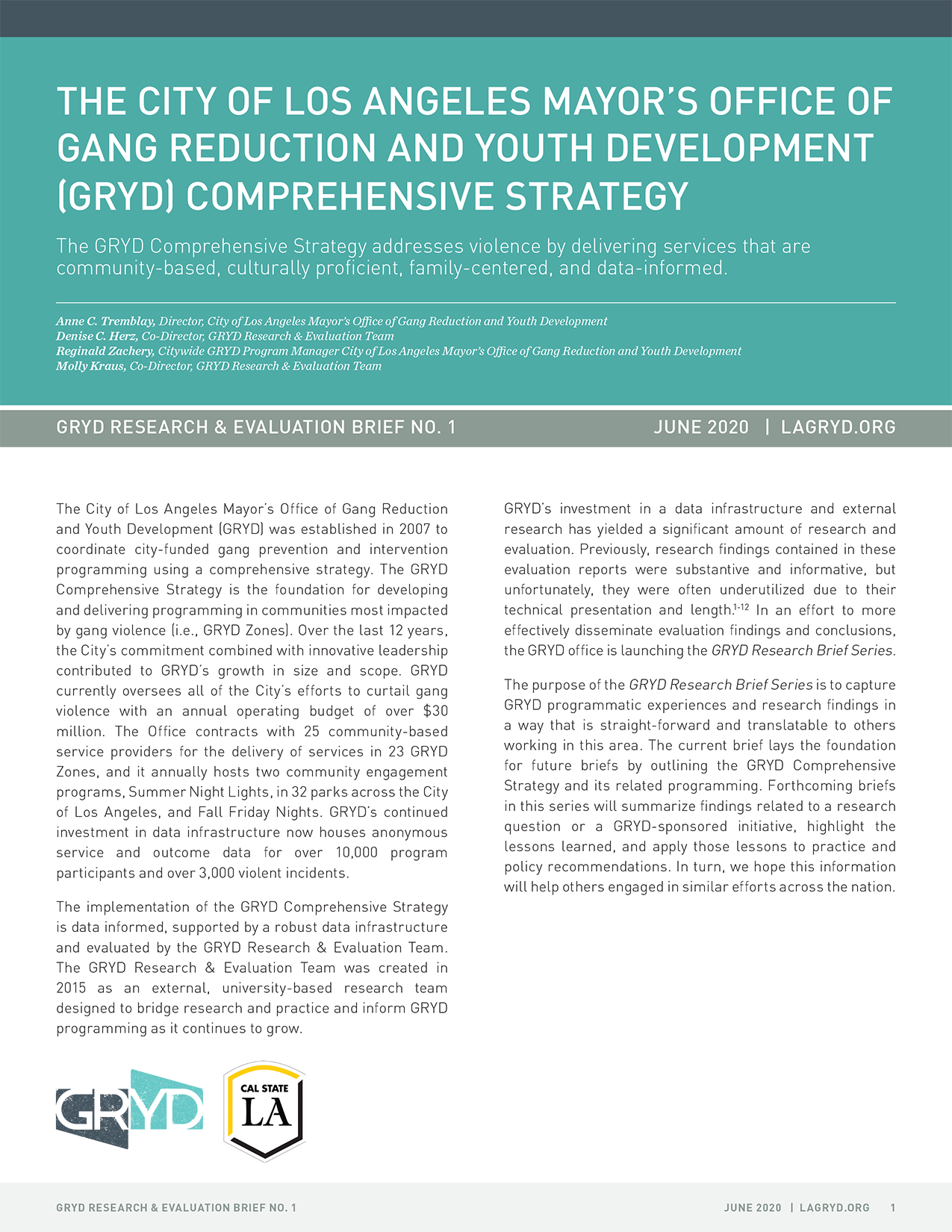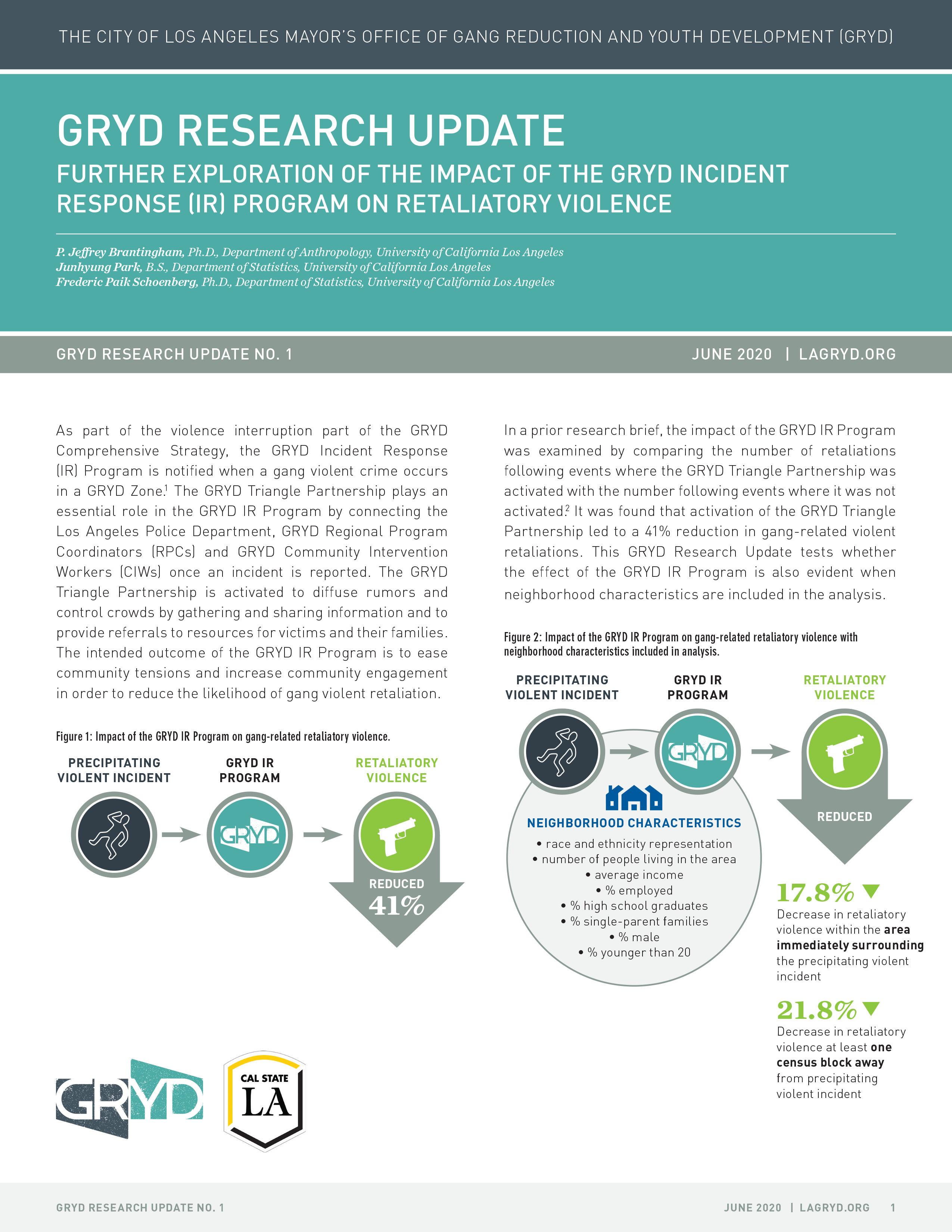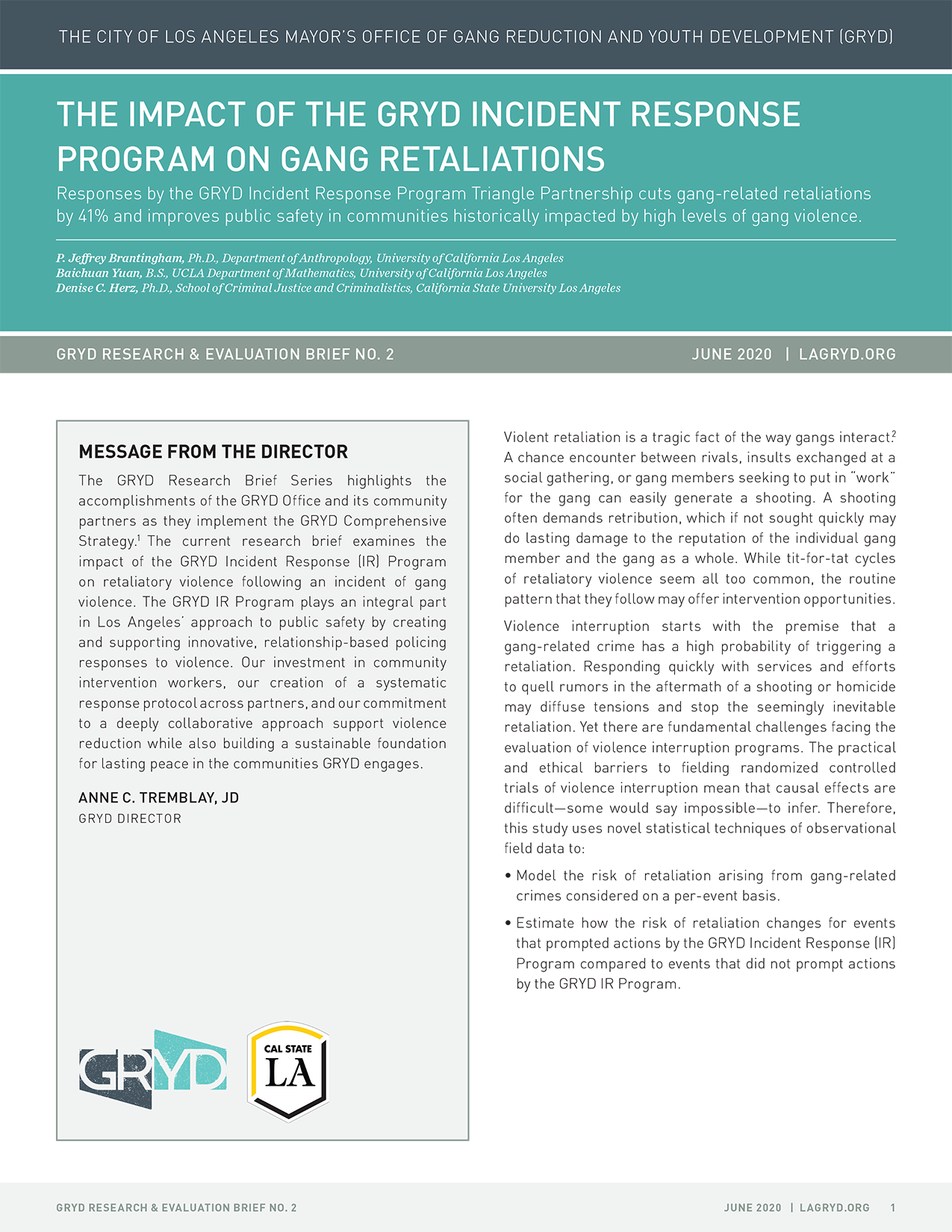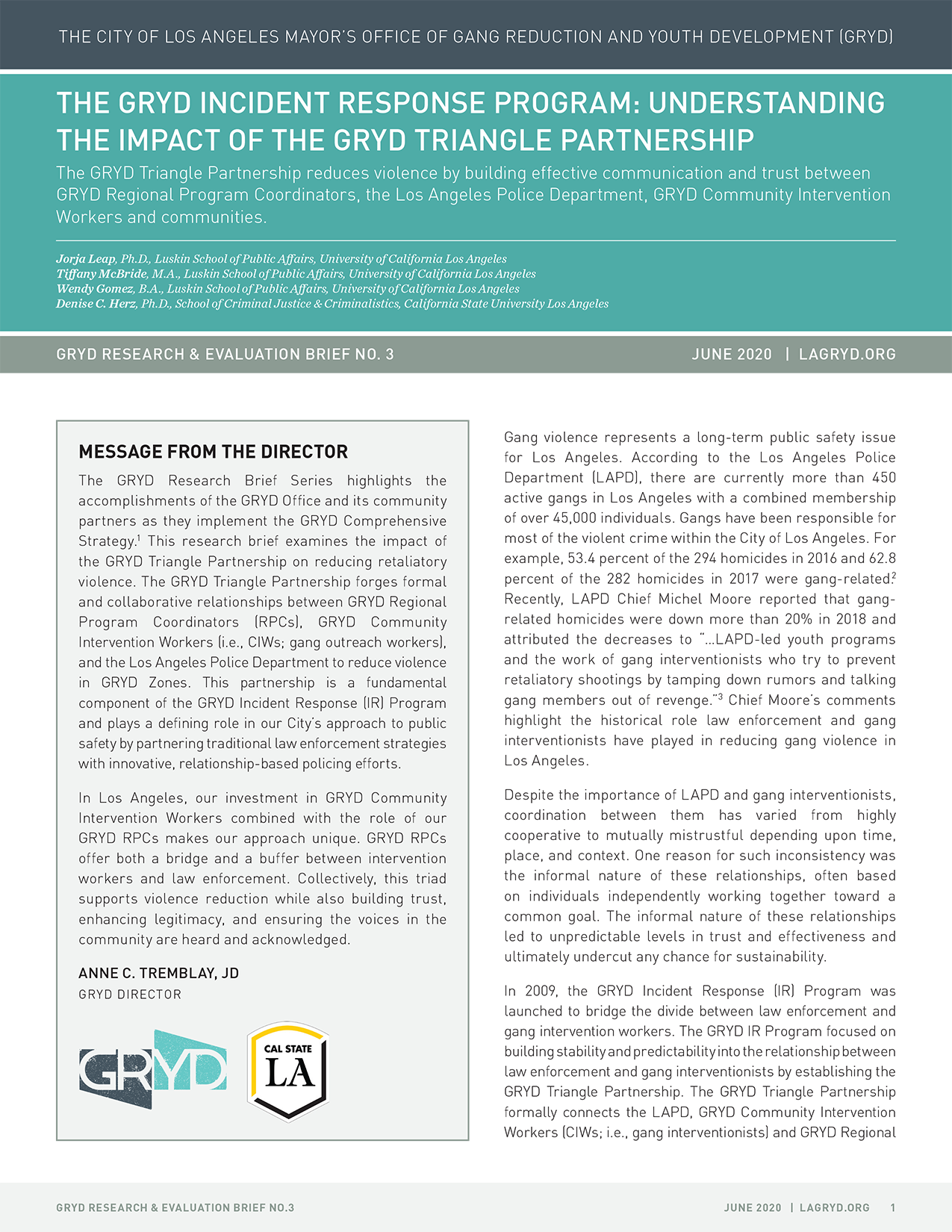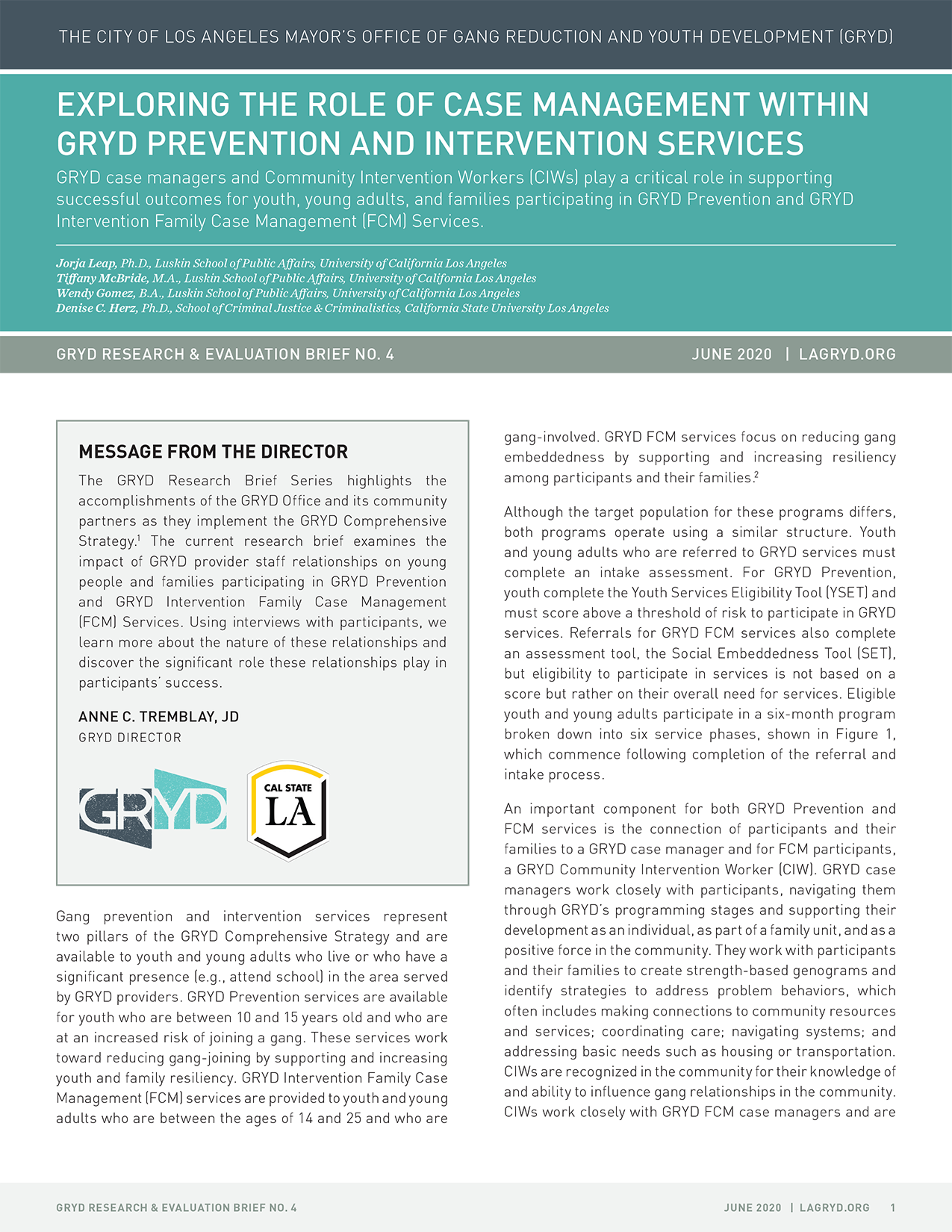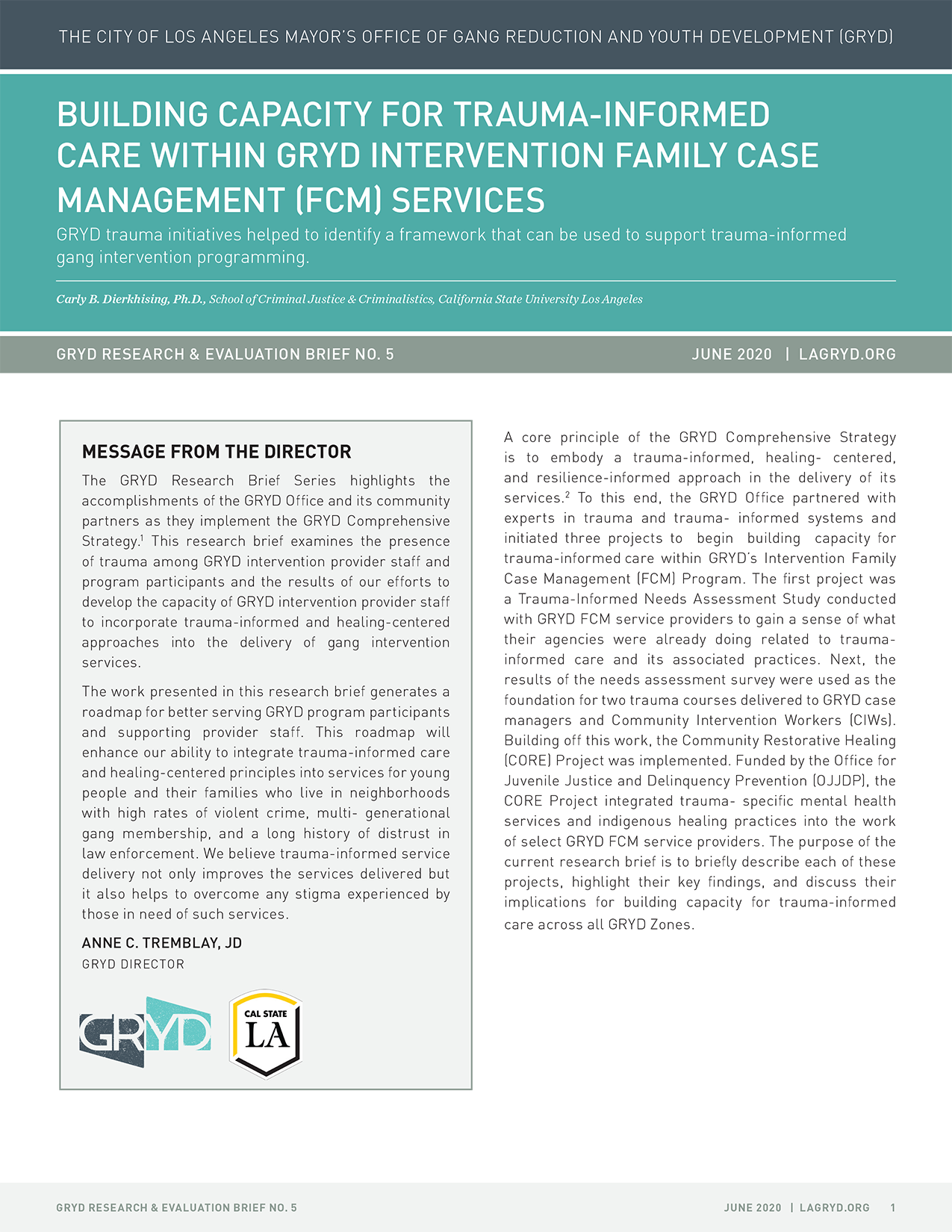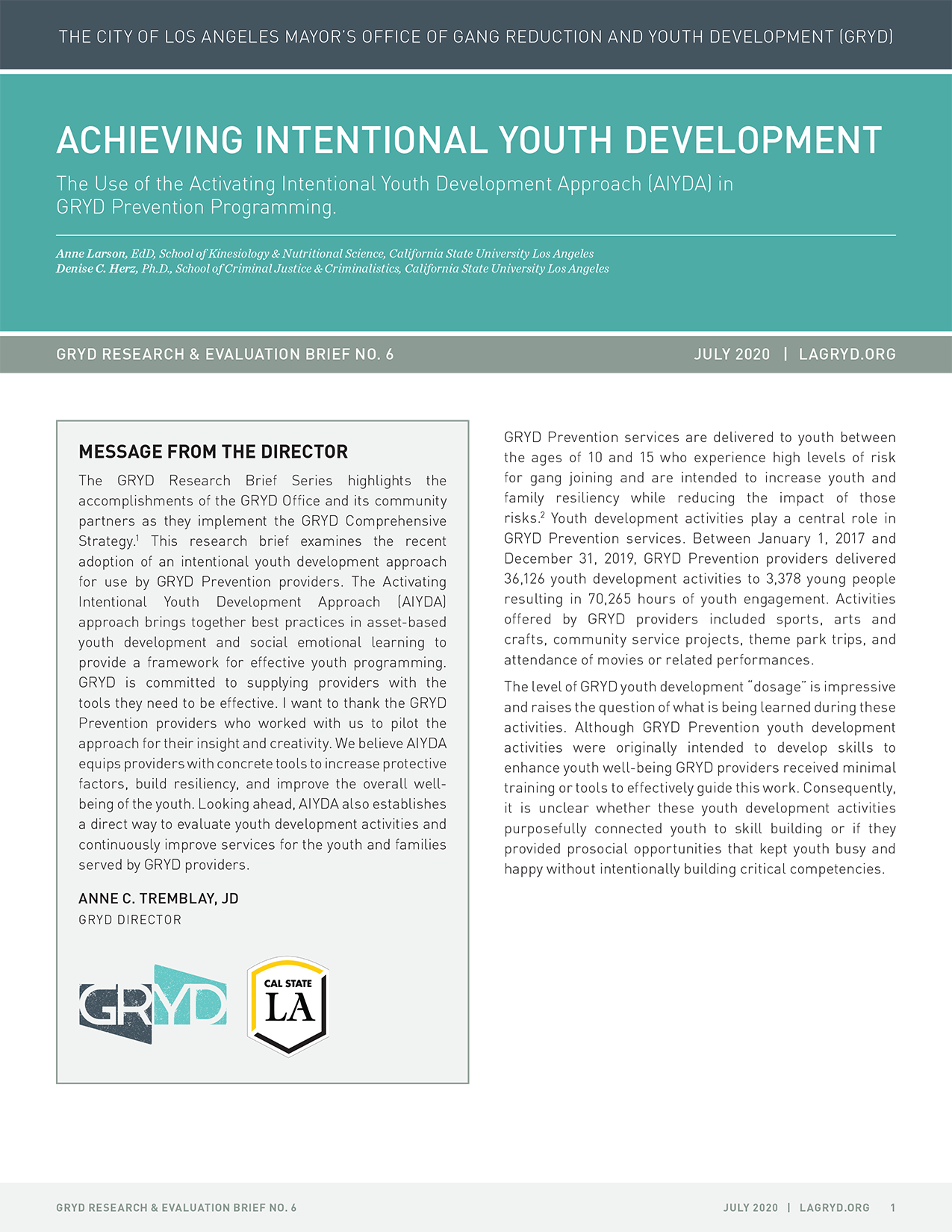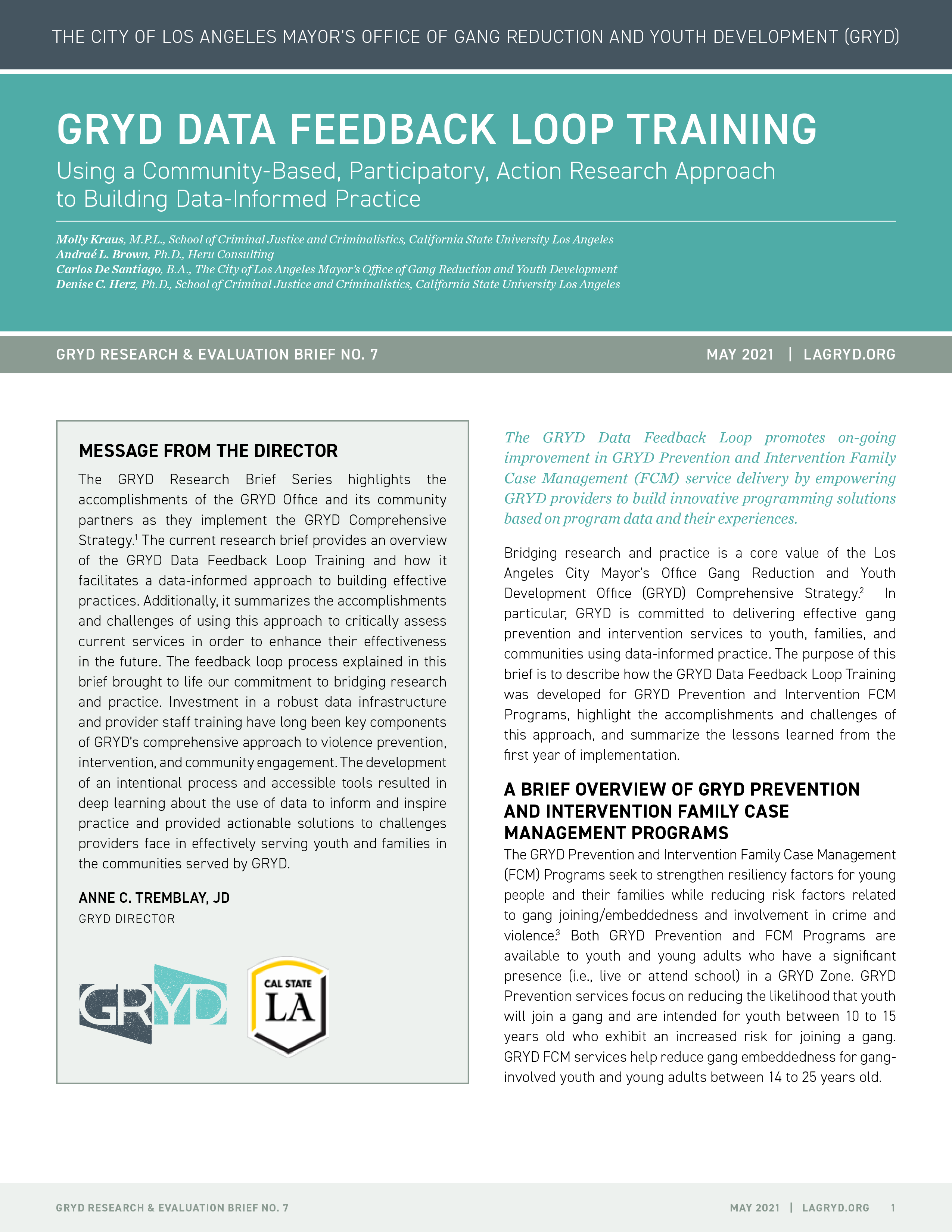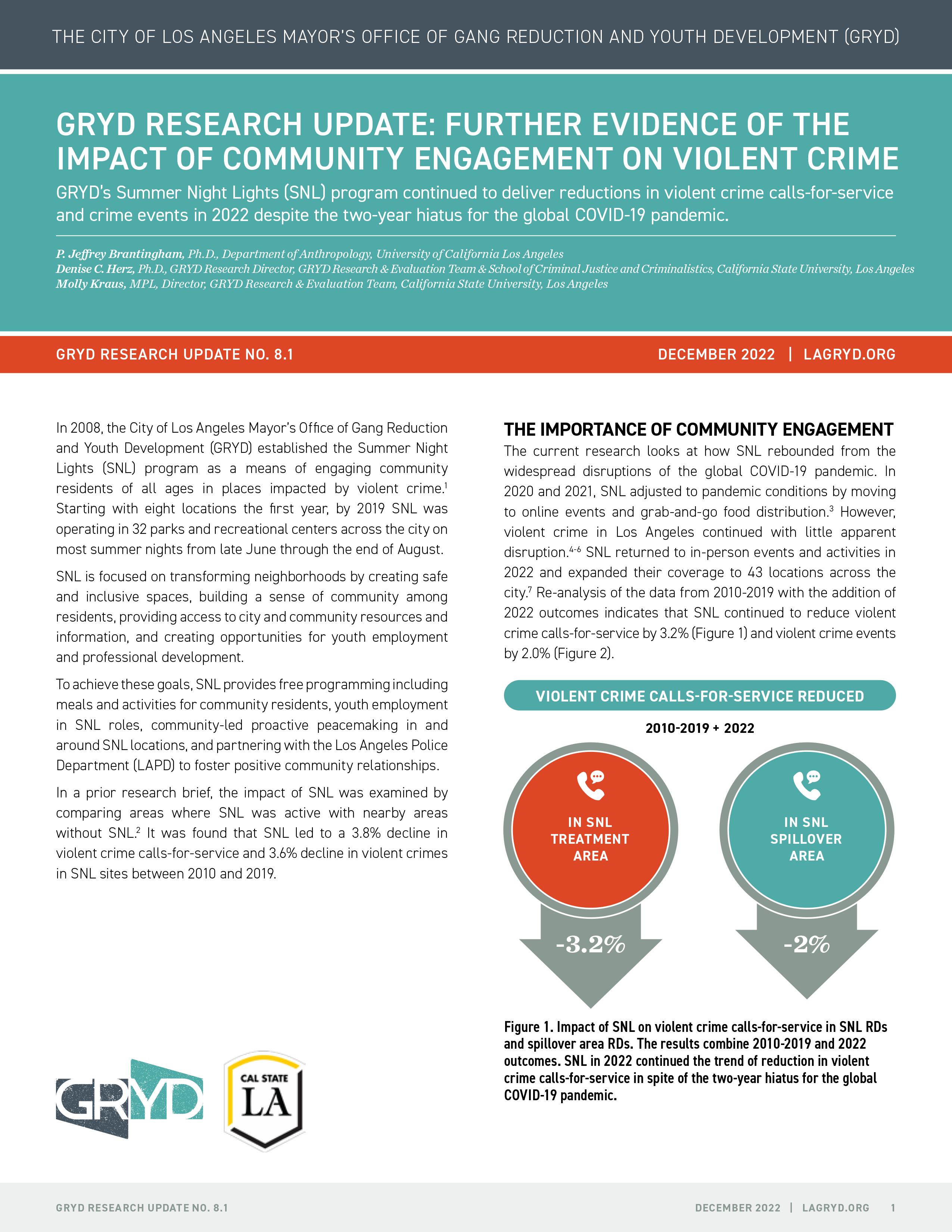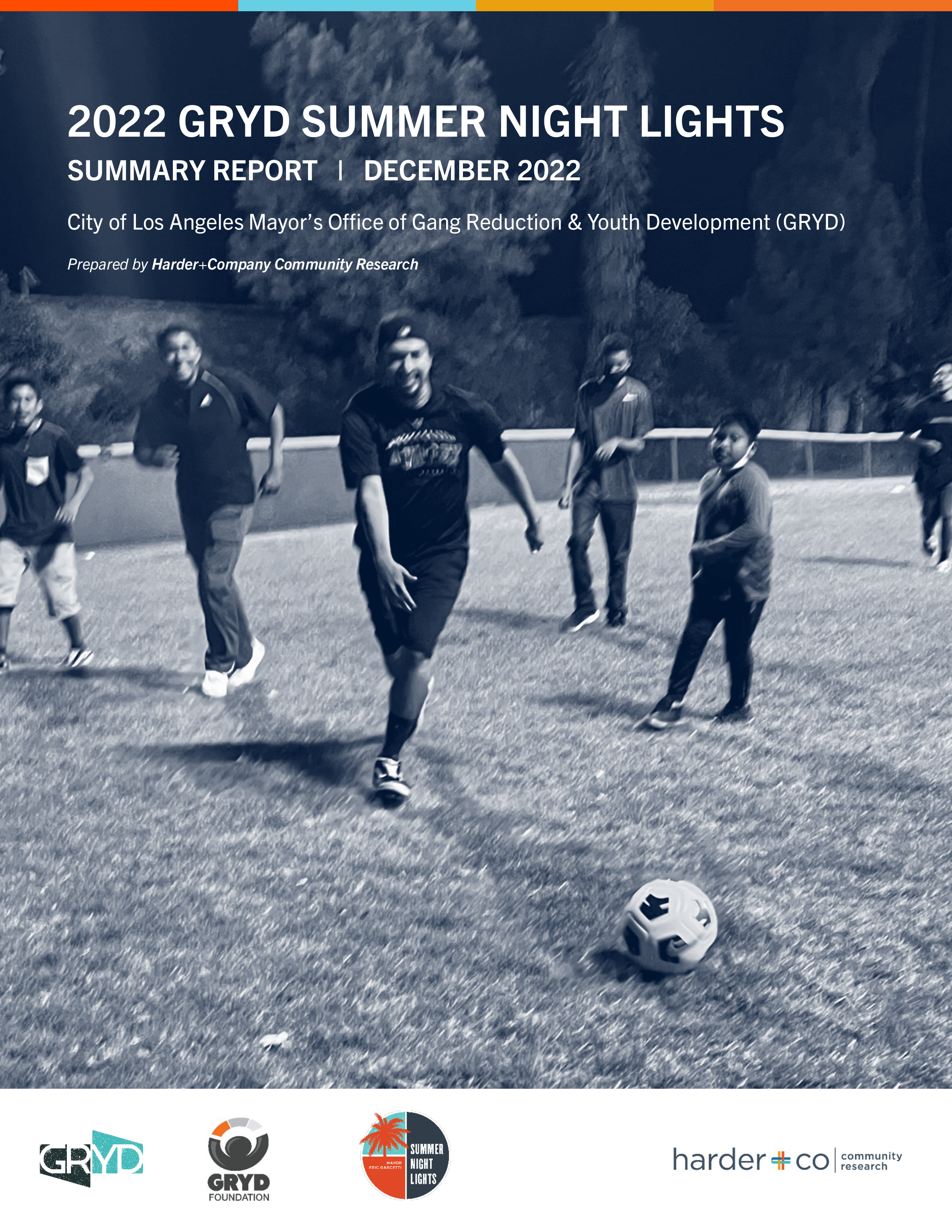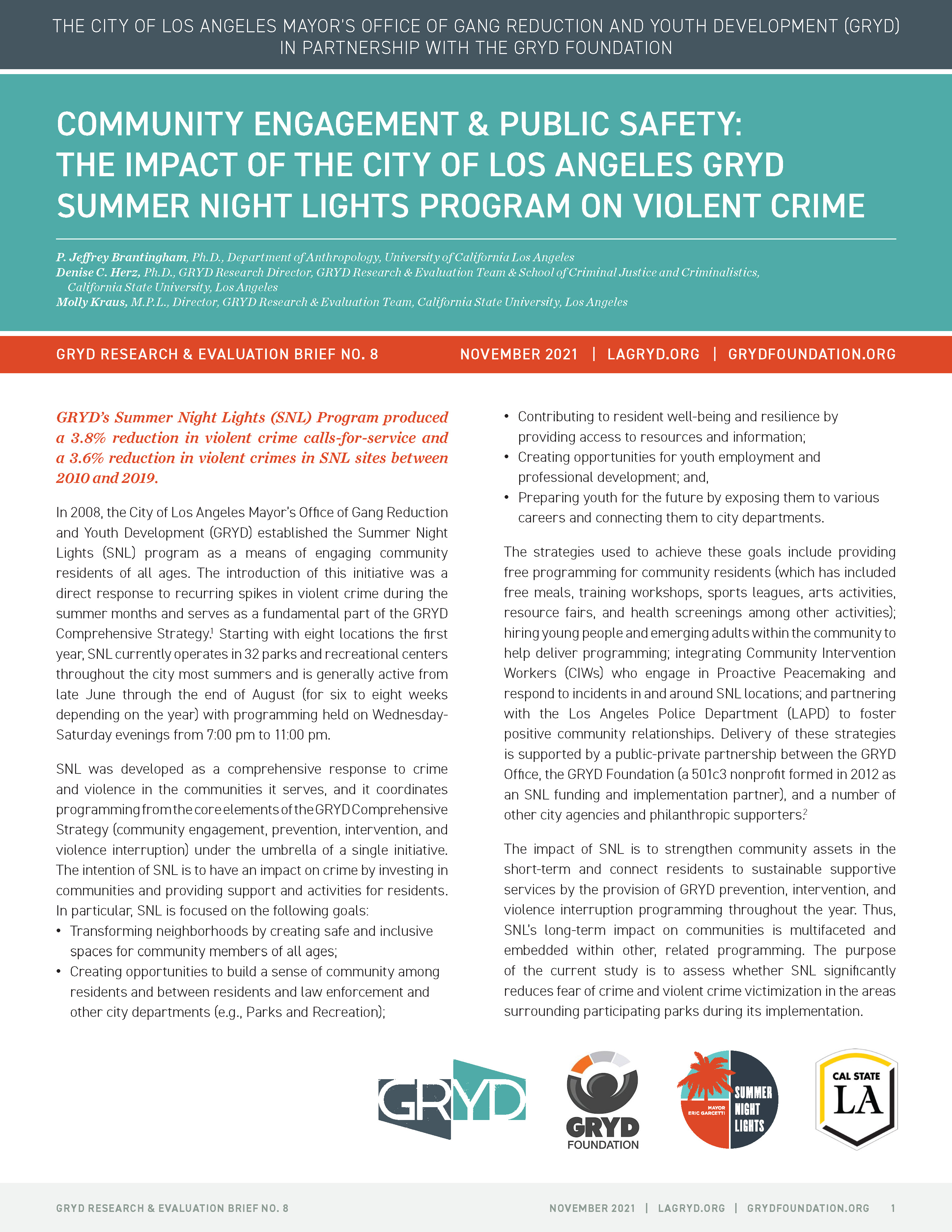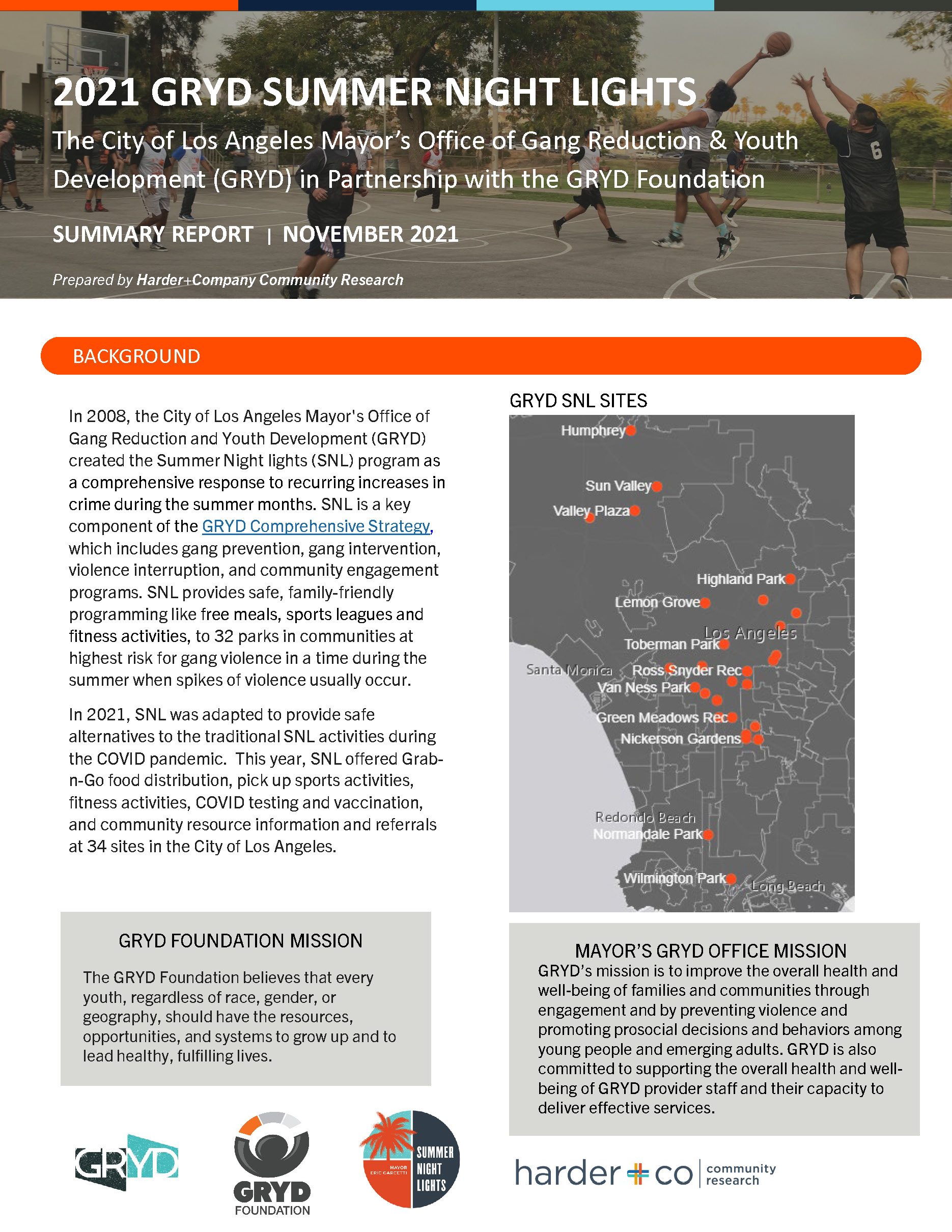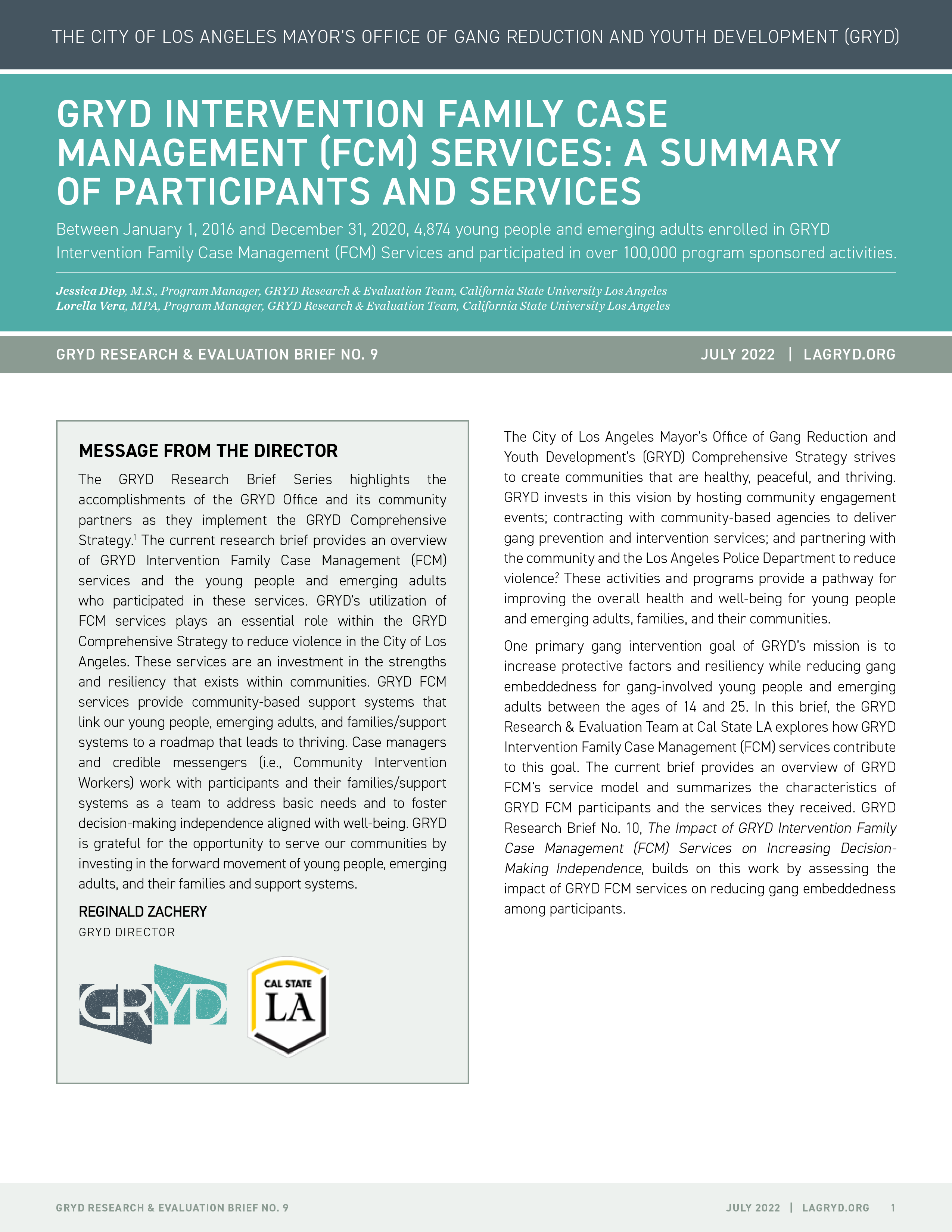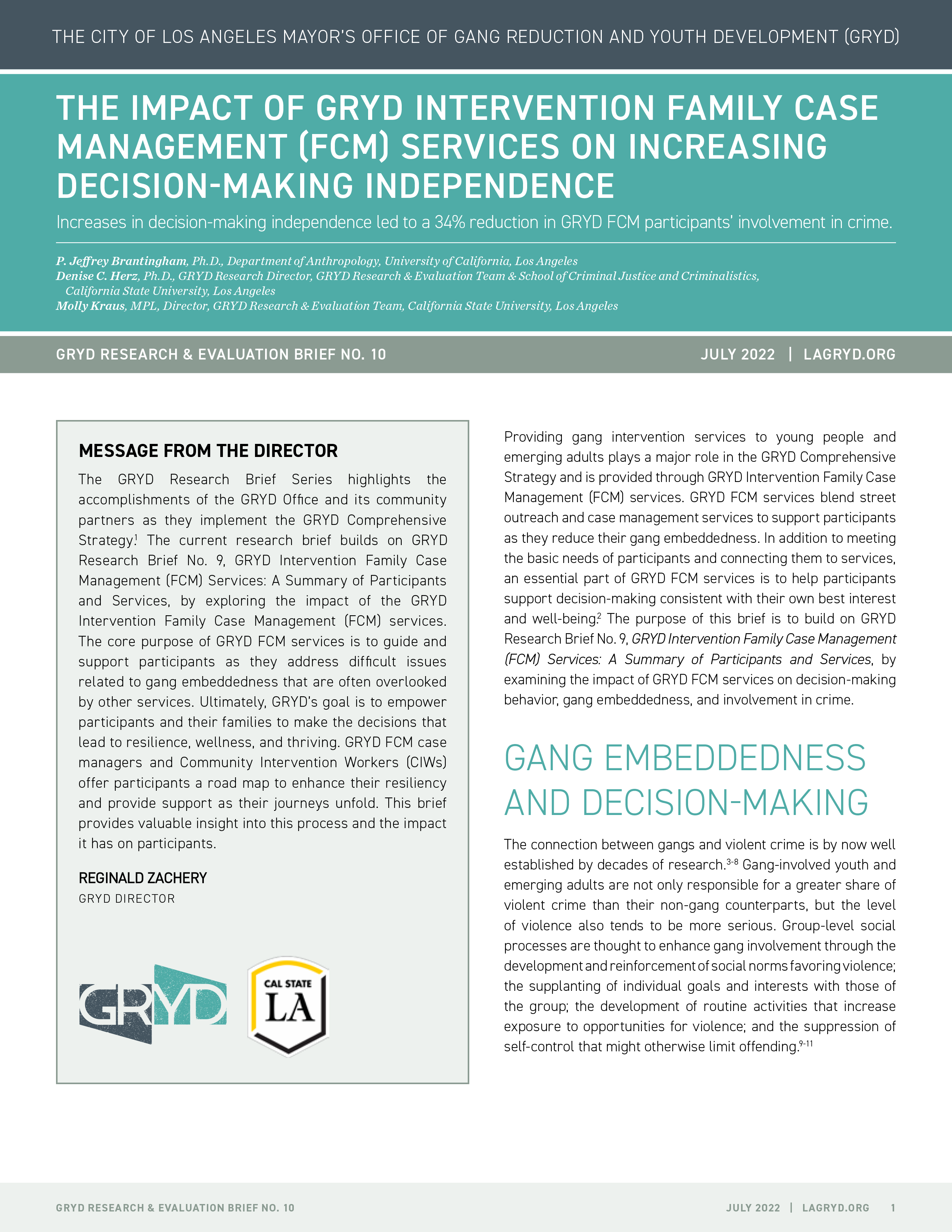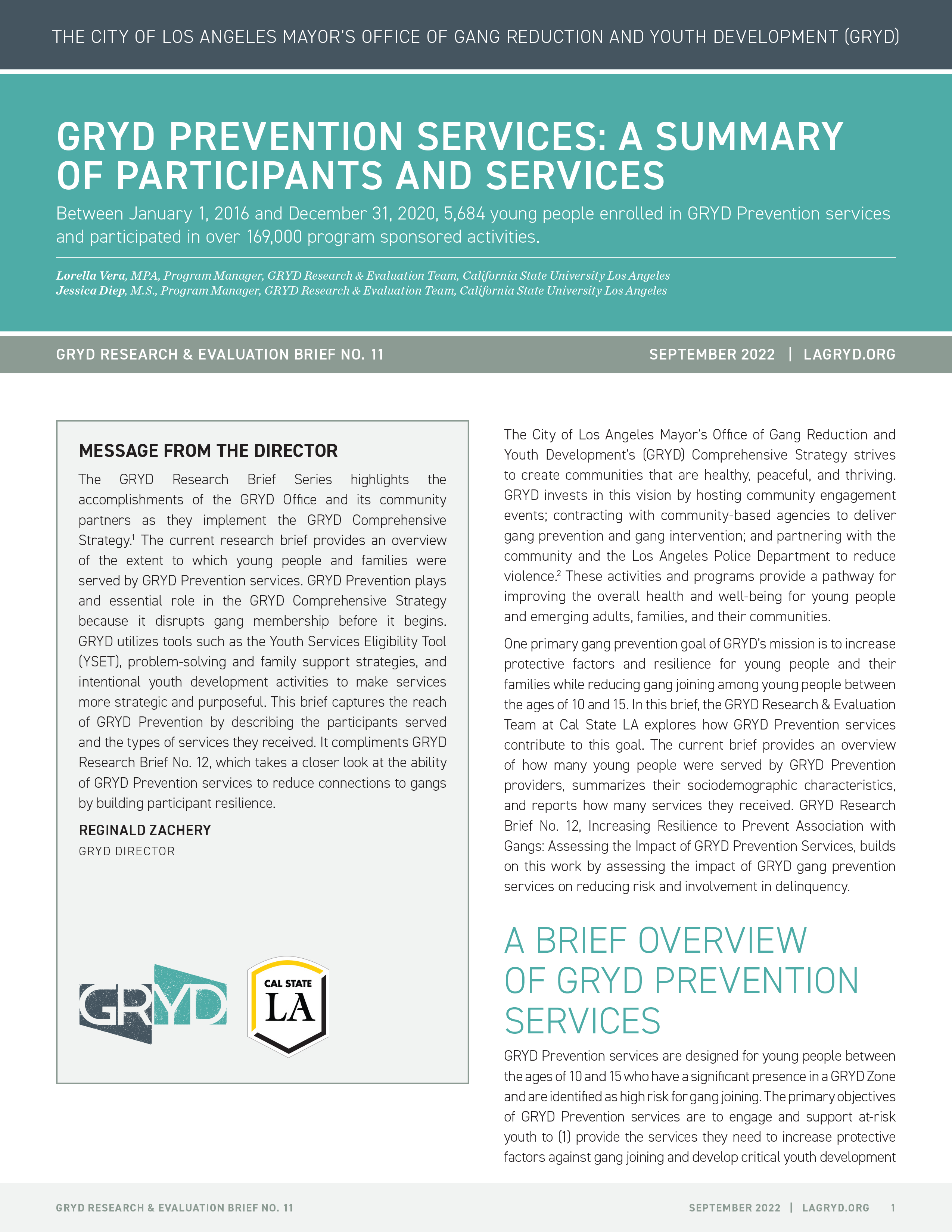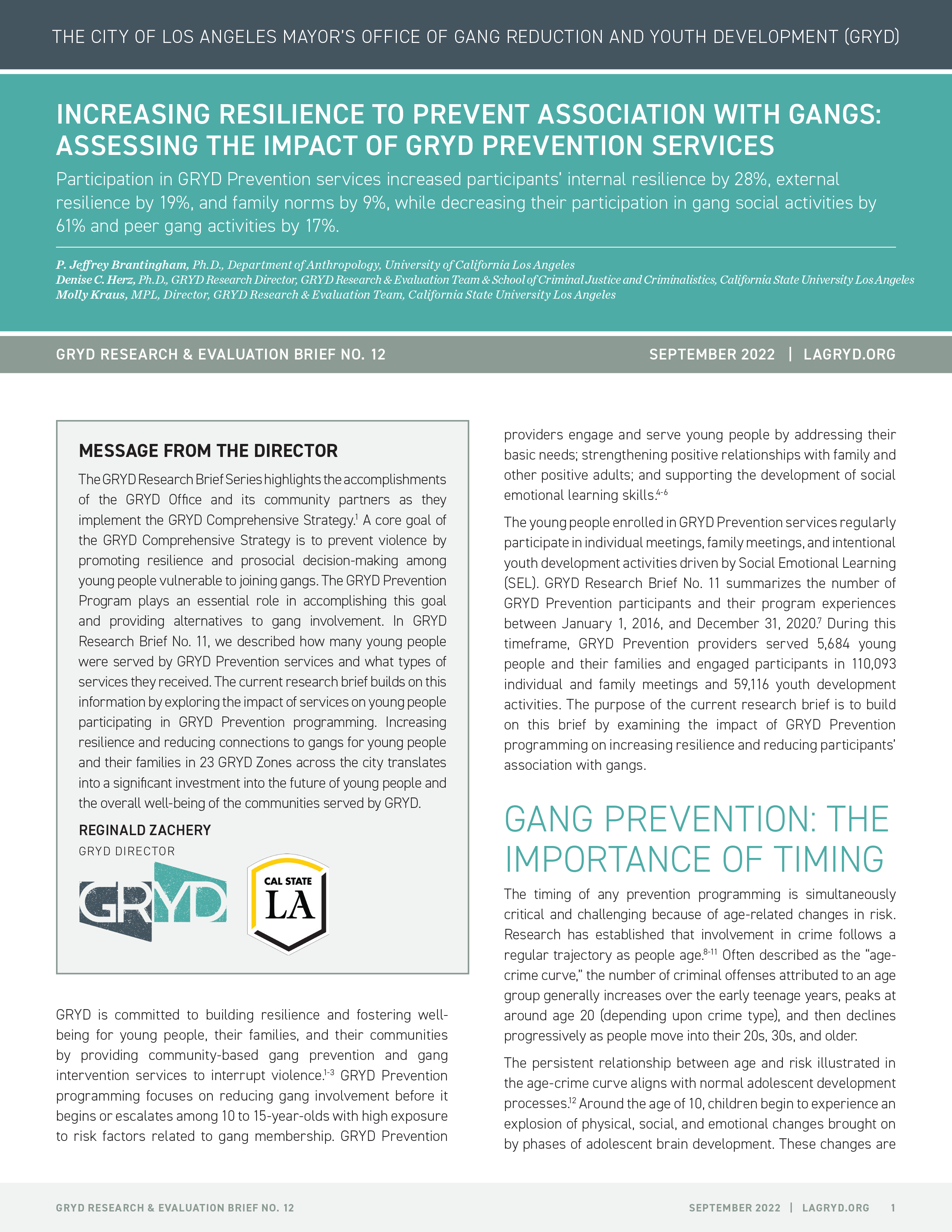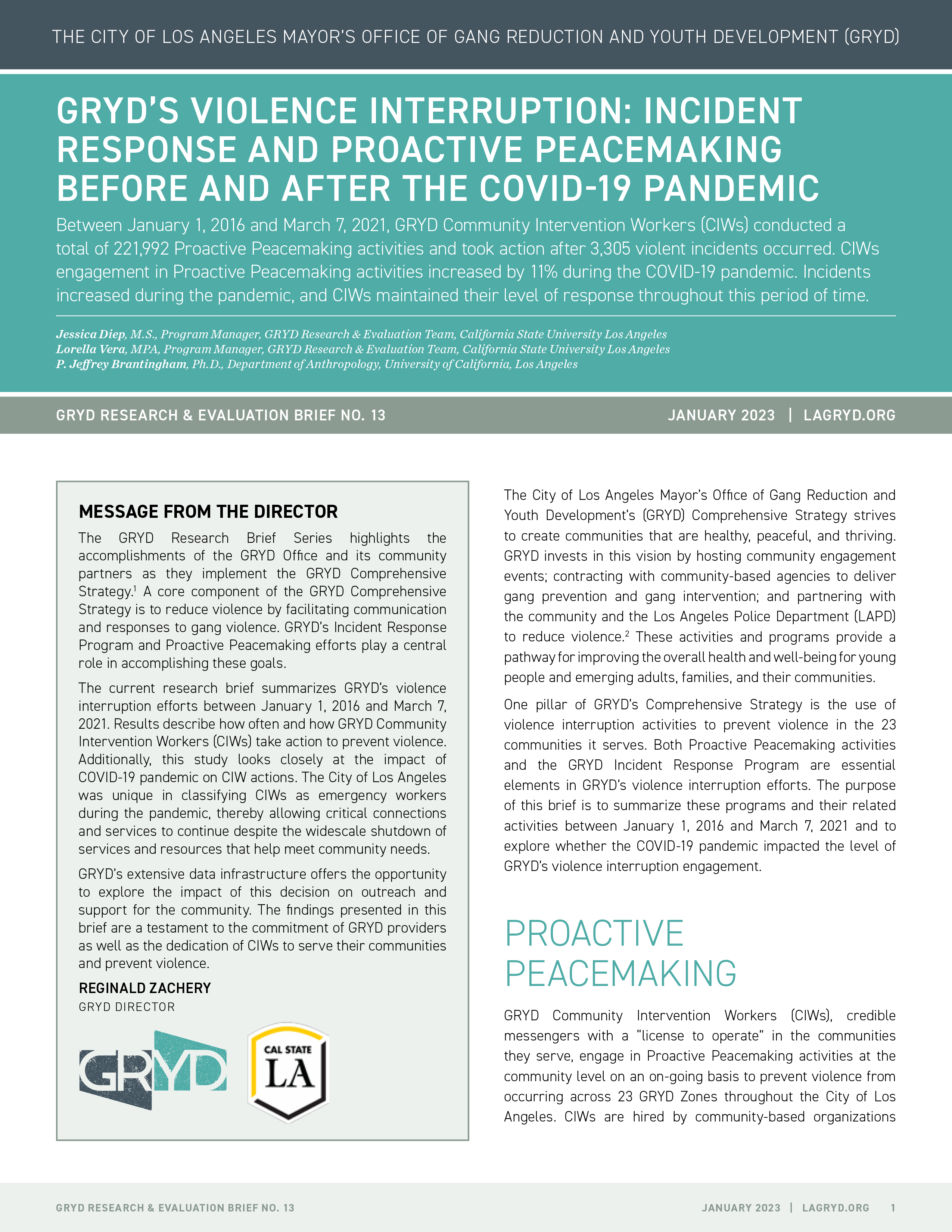
GRYD Research & Evaluation
Team Partners:
California State University, Los Angeles
Harder+Company Community Research
University of California, Los Angeles
University of Southern California
Subscribe here to receive release announcements and updates from the GRYD Research & Evaluation Team.

The purpose of the GRYD Research Brief Series is to capture GRYD programmatic experiences and research findings in a way that is straight-forward and translatable to others working in this area. The inaugural brief lays the foundation for future briefs by outlining the GRYD Comprehensive Strategy and its related programming. Forthcoming briefs in this series will summarize findings related to a research question or a GRYD-sponsored initiative, highlight the lessons learned, and apply those lessons to practice and policy recommendations.
The pupose of each brief and a summary of findings are presented in the document: An Overview of GRYD Research & Evaluation. Click here to learn more. Full briefs are listed below.
GRYD Research & Evaluation Brief No. 1: June 2020 THE CITY OF LOS ANGELES MAYOR'S OFFICE OF GANG REDUCTION AND YOUTH DEVELOPMENT (GRYD) COMPREHENSIVE STRATEGY
Anne C. Tremblay, Director, City of Los Angeles Mayor's Office of Gang Reduction and Youth DevelopmentDenise C. Herz, Co-Director, GRYD Research & Evaluation TeamReginald Zachery, Citywide GRYD Program Manager, City of Los Angeles Mayor's Office of Gang Reduction and Youth DevelopmentMolly Kraus, Co-Director, GRYD Research & Evaluation TeamClick here to learn more.
|
GRYD Research Update No. 2.1: June 2020 FURTHER EXPLORATION OF THE IMPACT OF THE GRYD INCIDENT RESPONSE (IR) PROGRAM ON RETALIATORY VIOLENCE
P. Jeffrey Brantingham, Ph. D., Department of Anthropology, University of California Los AngelesJunhyung Park, B.S., Department of Statistics, University of California Los AngelesFrederic Paik Schoenberg, Ph.D., Department of Statistics, University of California Los AngelesClick here to learn more.
|
GRYD Research & Evaluation Brief No. 3: June 2020 THE GRYD INCIDENT RESPONSE PROGRAM: UNDERSTANDING THE IMPACT OF THE GRYD TRIANGLE PARTNERSHIP
Jorja Leap, Ph.D., Luskin School of Public Affairs, University of California Los AngelesTiffany McBride, M.A., Luskin School of Public Affairs, University of California Los AngelesWendy Gomez, B.A., Luskin School of Public Affairs, University of California Los AngelesDenise C. Herz, Ph. D., School of Criminal Justice and Criminalistics, California State University Los AngelesClick here to learn more. |
GRYD Research & Evaluation Brief No. 4: June 2020 EXPLORING THE ROLE OF CASE MANAGEMENT WITHIN GRYD PREVENTION AND INTERVENTION SERVICES
Jorja Leap, Ph.D., Luskin School of Public Affairs, University of California Los AngelesTiffany McBride, M.A., Luskin School of Public Affairs, University of California Los AngelesWendy Gomez, B.A., Luskin School of Public Affairs, University of California Los AngelesDenise C. Herz, Ph. D., School of Criminal Justice and Criminalistics, California State University Los AngelesClick here to learn more. |
GRYD Research & Evaluation Brief No. 5: June 2020 BUILDING CAPACITY FOR TRAUMA-INFORMED CARE WITHIN GRYD INTERVENTION FAMILY CASE MANAGEMENT (FCM) SERVICES
Carly B. Dierkhising, Ph.D., School of Criminal Justice & Criminalistics, California State University Los AngelesClick here to learn more. |
GRYD Research & Evaluation Brief No. 6: July 2020 ACHIEVING INTENTIONAL YOUTH DEVELOPMENT
Anne Larson, Ed.D., School of Kinesiology & Nutritional Science, California State University Los AngelesDenise C. Herz, Ph. D., School of Criminal Justice and Criminalistics, California State University Los AngelesClick here to learn more. |
GRYD Research & Evaluation Brief No. 7: May 2021 GRYD DATA FEEDBACK LOOP TRAINING: USING A COMMUNITY-BASED, PARTICIPATORY, ACTION RESEARCH APPROACH TO BUILDING DATA-INFORMED PRACTICE
Molly Kraus, MPL, Director, GRYD Research & Evaluation Team, California State University Los AngelesAndraé L. Brown, Ph.D., Heru ConsultingCarlos De Santiago, B.A., The City of Los Angeles Mayor’s Office of Gang Reduction and Youth DevelopmentDenise C. Herz, Ph.D., GRYD Research Director, GRYD Research & Evaluation Team & School of Criminal Justice and Criminalistics, California State University Los AngelesClick here to learn more. |
GRYD Research Update No. 8.1: December 2022 FURTHER EVIDENCE OF THE IMPACT OF COMMUNITY ENGAGEMENT ON VIOLENT CRIME
P. Jeffrey Brantingham, Ph.D., Department of Anthropology, University of California Los AngelesDenise C. Herz, Ph.D., GRYD Research Director, GRYD Research & Evaluation Team & School of Criminal Justice and Criminalistics, California State University Los AngelesMolly Kraus, MPL, Director, GRYD Research & Evaluation Team, California State University Los AngelesClick here to learn more.
|
GRYD Research & Evaluation Brief No. 9: July 2022 GRYD INTERVENTION FAMILY CASE MANAGEMENT (FCM) SERVICES: A SUMMARY OF PARTICIPANTS AND SERVICES
Jessica Diep, M.S., Program Manager, GRYD Research & Evaluation Team, California State University Los AngelesLorella Vera, MPA, Program Manager, GRYD Research & Evaluation Team, California State University Los AngelesClick here to learn more. |
GRYD Research & Evaluation Brief No. 10: July 2022 THE IMPACT OF GRYD INTERVENTION FAMILY CASE MANAGEMENT (FCM) SERVICES ON INCREASING DECISION-MAKING INDEPENDENCE
P. Jeffrey Brantingham, Ph.D., Department of Anthropology, University of California Los AngelesDenise C. Herz, Ph.D., GRYD Research Director, GRYD Research & Evaluation Team & School of Criminal Justice and Criminalistics, California State University Los AngelesMolly Kraus, MPL, Director, GRYD Research & Evaluation Team, California State University Los AngelesClick here to learn more. |
GRYD Research & Evaluation Brief No. 11: September 2022 GRYD PREVENTION SERVICES: A SUMMARY OF PARTICIPANTS AND SERVICES
Lorella Vera, MPA, Program Manager, GRYD Research & Evaluation Team, California State University Los AngelesJessica Diep, M.S., Program Manager, GRYD Research & Evaluation Team, California State University Los AngelesClick here to learn more. |
GRYD Research & Evaluation Brief No. 12: September 2022 INCREASING RESILIENCE TO PREVENT ASSOCIATION WITH GANGS: ASSESSING THE IMPACT OF GRYD PREVENTION SERVICES
P. Jeffrey Brantingham, Ph.D., Department of Anthropology, University of California Los AngelesDenise C. Herz, Ph.D., GRYD Research Director, GRYD Research & Evaluation Team & School of Criminal Justice and Criminalistics, California State University Los AngelesMolly Kraus, MPL, Director, GRYD Research & Evaluation Team, California State University Los AngelesClick here to learn more. |
GRYD Research & Evaluation Brief No. 13: January 2023 GRYD'S VIOLENCE INTERRUPTION: INCIDENT RESPONSE AND PROACTIVE PEACEMAKING BEFORE AND AFTER THE COVID-19 PANDEMIC
Jessica Diep, M.S., Program Manager, GRYD Research & Evaluation Team, California State University Los AngelesLorella Vera, MPA, Program Manager, GRYD Research & Evaluation Team, California State University Los AngelesP. Jeffrey Brantingham, Ph.D., Department of Anthropology, University of California Los AngelesClick here to learn more. |
